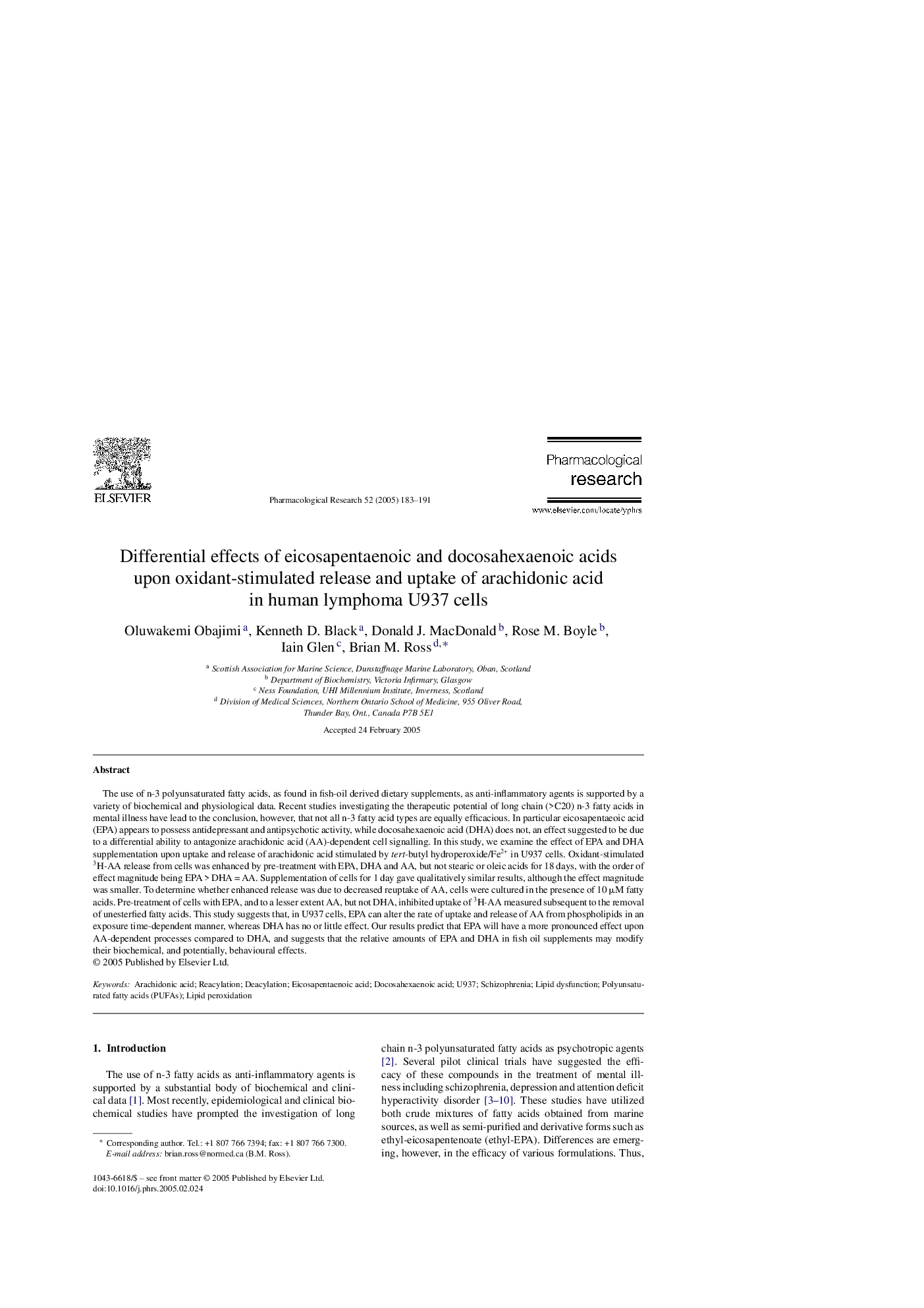| کد مقاله | کد نشریه | سال انتشار | مقاله انگلیسی | نسخه تمام متن |
|---|---|---|---|---|
| 9015715 | 1127352 | 2005 | 9 صفحه PDF | دانلود رایگان |
عنوان انگلیسی مقاله ISI
Differential effects of eicosapentaenoic and docosahexaenoic acids upon oxidant-stimulated release and uptake of arachidonic acid in human lymphoma U937 cells
دانلود مقاله + سفارش ترجمه
دانلود مقاله ISI انگلیسی
رایگان برای ایرانیان
کلمات کلیدی
U937ReacylationSchizophrenia - اسکیزوفرنی یا شیزوفرنیArachidonic acid - اسید آراشیدونیکEicosapentaenoic acid - اسید ایکوزاپنتانوئیکdocosahexaenoic acid - اسید داکوزاگزوائونیکPolyunsaturated fatty acids (PUFAs) - اسیدهای چرب اشباع نشده (PUFAs)Deacylation - خلع سلاحLipid peroxidation - پراکسیداسیون لیپید
موضوعات مرتبط
علوم پزشکی و سلامت
داروسازی، سم شناسی و علوم دارویی
داروشناسی
پیش نمایش صفحه اول مقاله

چکیده انگلیسی
The use of n-3 polyunsaturated fatty acids, as found in fish-oil derived dietary supplements, as anti-inflammatory agents is supported by a variety of biochemical and physiological data. Recent studies investigating the therapeutic potential of long chain (>C20) n-3 fatty acids in mental illness have lead to the conclusion, however, that not all n-3 fatty acid types are equally efficacious. In particular eicosapentaeoic acid (EPA) appears to possess antidepressant and antipsychotic activity, while docosahexaenoic acid (DHA) does not, an effect suggested to be due to a differential ability to antagonize arachidonic acid (AA)-dependent cell signalling. In this study, we examine the effect of EPA and DHA supplementation upon uptake and release of arachidonic acid stimulated by tert-butyl hydroperoxide/Fe2+ in U937 cells. Oxidant-stimulated 3H-AA release from cells was enhanced by pre-treatment with EPA, DHA and AA, but not stearic or oleic acids for 18 days, with the order of effect magnitude being EPA > DHA = AA. Supplementation of cells for 1 day gave qualitatively similar results, although the effect magnitude was smaller. To determine whether enhanced release was due to decreased reuptake of AA, cells were cultured in the presence of 10 μM fatty acids. Pre-treatment of cells with EPA, and to a lesser extent AA, but not DHA, inhibited uptake of 3H-AA measured subsequent to the removal of unesterfied fatty acids. This study suggests that, in U937 cells, EPA can alter the rate of uptake and release of AA from phospholipids in an exposure time-dependent manner, whereas DHA has no or little effect. Our results predict that EPA will have a more pronounced effect upon AA-dependent processes compared to DHA, and suggests that the relative amounts of EPA and DHA in fish oil supplements may modify their biochemical, and potentially, behavioural effects.
ناشر
Database: Elsevier - ScienceDirect (ساینس دایرکت)
Journal: Pharmacological Research - Volume 52, Issue 2, August 2005, Pages 183-191
Journal: Pharmacological Research - Volume 52, Issue 2, August 2005, Pages 183-191
نویسندگان
Oluwakemi Obajimi, Kenneth D. Black, Donald J. MacDonald, Rose M. Boyle, Iain Glen, Brian M. Ross,